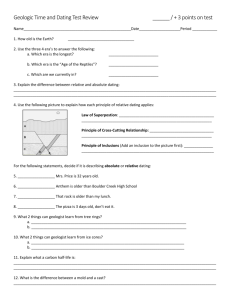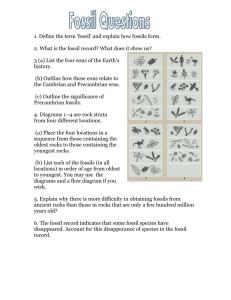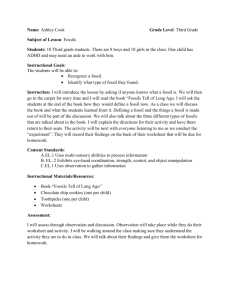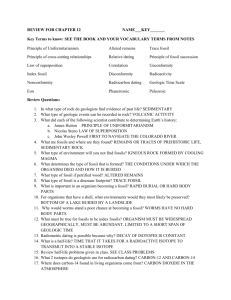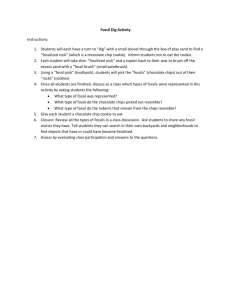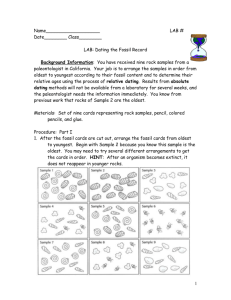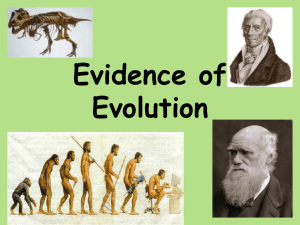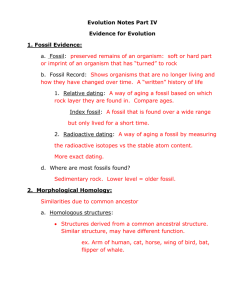A Date with a fossil lab
advertisement
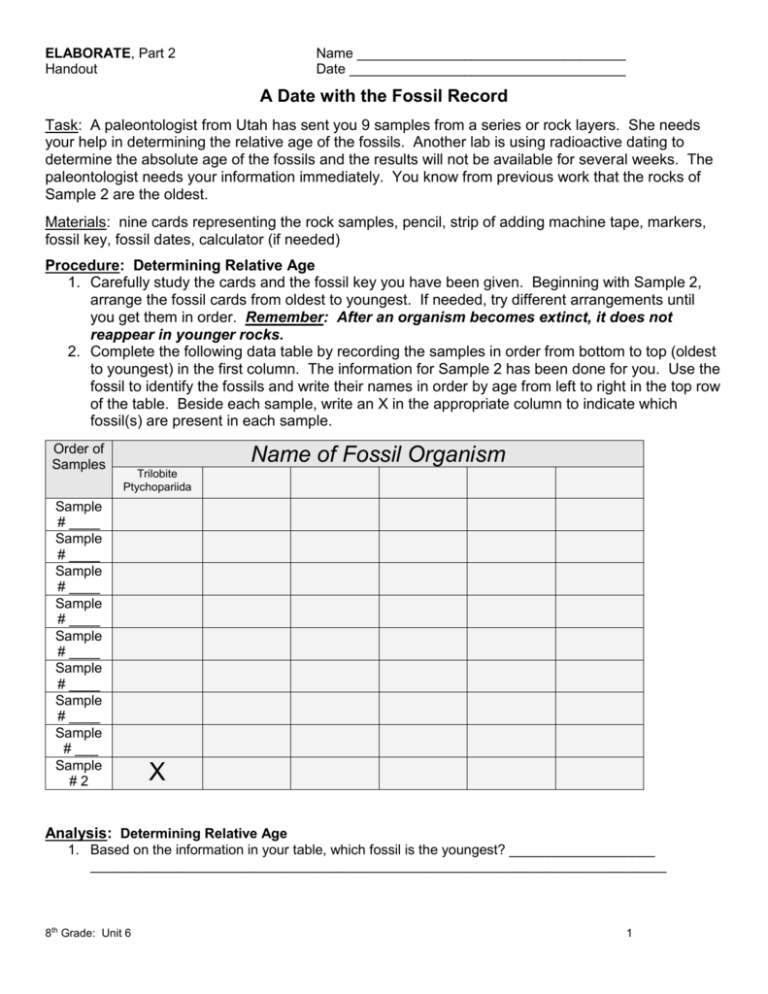
ELABORATE, Part 2 Handout Name ___________________________________ Date ____________________________________ A Date with the Fossil Record Task: A paleontologist from Utah has sent you 9 samples from a series or rock layers. She needs your help in determining the relative age of the fossils. Another lab is using radioactive dating to determine the absolute age of the fossils and the results will not be available for several weeks. The paleontologist needs your information immediately. You know from previous work that the rocks of Sample 2 are the oldest. Materials: nine cards representing the rock samples, pencil, strip of adding machine tape, markers, fossil key, fossil dates, calculator (if needed) Procedure: Determining Relative Age 1. Carefully study the cards and the fossil key you have been given. Beginning with Sample 2, arrange the fossil cards from oldest to youngest. If needed, try different arrangements until you get them in order. Remember: After an organism becomes extinct, it does not reappear in younger rocks. 2. Complete the following data table by recording the samples in order from bottom to top (oldest to youngest) in the first column. The information for Sample 2 has been done for you. Use the fossil to identify the fossils and write their names in order by age from left to right in the top row of the table. Beside each sample, write an X in the appropriate column to indicate which fossil(s) are present in each sample. Order of Samples Name of Fossil Organism Trilobite Ptychopariida Sample # ____ Sample # ____ Sample # ____ Sample # ____ Sample # ____ Sample # ____ Sample # ____ Sample # ___ Sample #2 X Analysis: Determining Relative Age 1. Based on the information in your table, which fossil is the youngest? ___________________ ___________________________________________________________________________ 8th Grade: Unit 6 1 2. Look at the X’s in the table. What would you conclude if there was an X outside the pattern? __________________________________________________________________________ __________________________________________________________________________ __________________________________________________________________________ __________________________________________________________________________ 3. Does the information you have so far tell the exact age of a particular fossil? Why or why not? ______________________________________________________________________ __________________________________________________________________________ __________________________________________________________________________ __________________________________________________________________________ 4. What information does relative dating provide to paleontologists? _____________________ __________________________________________________________________________ __________________________________________________________________________ __________________________________________________________________________ __________________________________________________________________________ Procedure: Creating the Timeline 1. Now you are going to prepare a timeline for the paleontologist in Utah with the dates from the radioactive dating lab. When looking at the information from the lab, you discover that the dates are no longer attached to the appropriate rock samples. Since the process of absolute dating is very expensive, you can’t pay to have it done again. Then, you realize that since you have determined the relative ages of the samples, all you have to do is arrange the dates from oldest to youngest and record the dates in your table from oldest to youngest. 2. Use colored markers or pencils and the adding machine tape provided to make your timeline. Your timeline should include the dates, fossil names, and fossil drawing. Analysis: Creating the Timeline 1. Based on absolute dating, which fossil organism lived for the longest period of time? _______________________________ Which fossil organism lived for the shortest period of time? ________________________________ Explain your answers. _______________________________________________________ __________________________________________________________________________ . __________________________________________________________________________ __________________________________________________________________________ __________________________________________________________________________ __________________________________________________________________________________ __________________________________________________________________ . __________________________________________________________________________ __________________________________________________________________________ __________________________________________________________________________ __________________________________________________________________________ 2. How could you use the information on your timeline to determine the age range of the Ammonite? . __________________________________________________________________________ __________________________________________________________________________ __________________________________________________________________________ __________________________________________________________________________________ __________________________________________________________________ 8th Grade: Unit 6 2 Fossil Key Trilobite Ammonite Seed Plant Leaf Bony Fish Crinoid Shark 8th Grade: Unit 6 3 8th Grade: Unit 6 4 Sample 4 Sample 5 Sample 6 Sample 1 Sample 2 Sample 3 Sample 9 Sample 8 Sample 7
